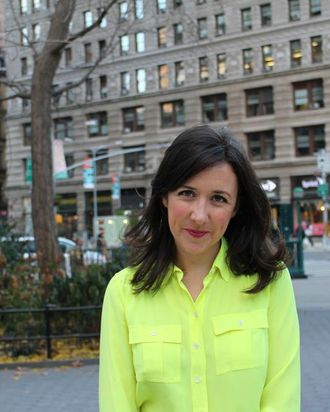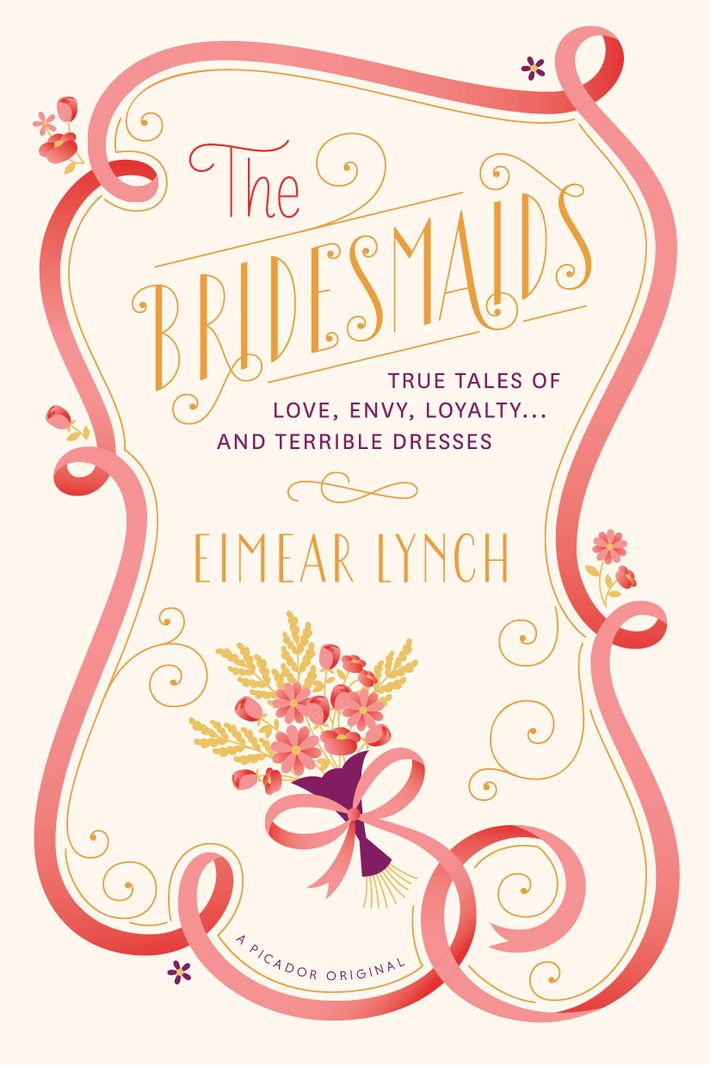
Eimear Lynch had been a bridesmaid twice in five years when she decided to write a book about the somewhat odd custom of nuptial-inspired, dress-matching solidarity. The day after she got a book deal, her younger sister got engaged, marking her fifth friendly trip down the aisle. Yet bridesmaid experience aside, Lynch — a former Condé Nast Traveler, Town & Country, and Bloomsberg Businessweek editor — is an unlikely candidate to write a book about weddings: She’s neither wedding obsessed (“I just don’t really care what my wedding is like,” she told the Cut) nor is she particularly disgruntled about her never-ending bridesmaid experience. Despite her admission that she was “maybe a little cynical” when she started writing the book, she considers all of her bridesmaid experiences “very positive,” and asserts that her sister’s wedding brought them closer.
In fact, she claims that working on the book — which involved interviewing 80 bridesmaids — made her less cynical about the tradition. “When you think of spending months reporting a book about bridesmaids, it sounds a little horrific,” she told the Cut. “But some of the stories were so sweet and so sentimental — the bridesmaids spoke of the weddings as if they were their own.” The resulting book, The Bridesmaids (out last week), is a surprisingly moving oral history of wedding party experiences, ranging from brothers who have served as bridesmen to the 13-year-old responsible for folding Princess Diana’s legendary train at the royal wedding.
The Cut spoke with Lynch about bridesmaid red flags, how to gracefully decline to be a bridesmaid, and why she won’t be having bridesmaids at her own wedding.
How would you describe your relationship to being a bridesmaid before you started working on the book?
I was a bridesmaid for two friends from high school and two friends from college, and then my sister. And they were all really positive — no crazy brides. Still, going into the experience of being a bridesmaid for my sister, I was a little confused about what the point was. While I loved being a bridesmaid for all of my friends, it seemed a little like a tradition that didn’t have that much meaning. You go into it with this idea of what being a bridesmaid is like — everyone is always talking about the cost and the ugly dresses — and then you’re playing this role on the day where you’re like dressing up like you wouldn’t normally and you don’t really feel like yourself. I certainly had very positive experiences when I was planning all the festivities, and it meant a lot to me that I could do that for my friends, but I would say I was maybe a little cynical.
In the introduction to the book, you say that your conversations with other bridesmaids made you realize that your sister’s wedding scenario raised some “bridesmaids red flags.”
Yeah. The three red flags are that I’m older than she is — which, in my reporting, I often saw caused jealousy and stress in the older sister. And, our styles are different: She’s very sensible — she’s a nurse and she lives in the Midwest, and she just doesn’t care that much about clothes. I’m not really into fashion by any means, but we just have very different ideas about what people should wear, and that is a major predictor for fights over bridesmaid dresses, obviously. And it was my fifth time in the role, and I was kind of a cynic, and since I was reporting this book in the lead-up to the wedding, it was like, all bridesmaids all the time, so I could have been over it before it started, but luckily I wasn’t.
Were you surprised that interviews with 80 bridesmaids made you less cynical?
Yeah, I definitely was, and it made me think about the role differently going forward, and about friendship. I was surprised by the thoughtfulness of the bridesmaids. Weddings really are a marker point for everyone involved — people are reflecting on their lives and where they are and where their friends are, and that can make it really tough for some people, but it can also be a really important and meaningful point in your friendship.
Among the bridesmaids that you interviewed, what was the breakdown between those who had positive and negative experiences?
I think less than half of the bridesmaids in the book had negative examples, but I think that’s far from a representative sample size. I knew that I didn’t want the book to be really negative. But definitely a lot of people want to talk about how horrible their bridesmaid experience was, and those stories end up being very, very similar. So I tried to shy away from those. I did about 20 interviews that didn’t make it into the book, and a lot of them were people who thought they had a bridezilla on their hands, but I think that story is a little tired. And I think that a lot of the problems the bridesmaids talked about were self-inflicted — either they had a bad attitude from the beginning, or they didn’t really seem to support the wedding but felt like they had to be in the wedding, or couldn’t say no to being a bridesmaid. I wanted to make sure to show all the nuances of the role.
What was the most nightmarish bridesmaid story that you came across in your interviews?
One bridesmaid was asked to be in a college friend’s wedding and was really excited about it. The bride gave them a list of 20 things she expected from the bridesmaids over the course of the wedding, including having the wedding dress dry cleaned after the wedding and dropping it off at the bride’s house, even though they live in different cities. And there were other things that were extremely demanding, but the bridesmaid sort of thought it was a joke — but it clearly wasn’t, and she and her friend had a lot of arguments. [The bridesmaid] was also recovering from a serious accident and was on steroids which made her gain weight, and the bride told her that she needed to lose weight before the wedding. Things spiraled out of control and she ended up getting kicked out of the wedding and now they don’t speak anymore. That was the only story I encountered of someone getting kicked out of a wedding and bridesmaids who don’t speak to the brides anymore.
Among the disgruntled bridesmaids that you talked to, what were their biggest complaints?
I think that money is a huge complaint. You basically can’t be in a wedding these days, in a certain demographic, and get out without paying $2,000, between the bachelorette party, all the presents, the bridal shower, traveling to the wedding, the dress. It’s a lot of money to spend on something that’s a bit forced, sometimes. And obviously the dresses are a complaint, especially because they all match, and really demanding brides who treat them like they’re personal assistants. And brides who are insensitive to where the bridesmaid was in her life — people feel insecure about being single, or having just lost their job, or whatever — all these things that are going on in the bridesmaids’ lives that sometimes the bride overlooks.
In the book, you write that you won’t be having any bridesmaids at your own wedding. Why not?
I’m not someone who has thought a lot about my wedding in the past, but obviously if you’re interviewing 80 bridesmaids you do think about it. But mostly I just don’t really care what my wedding is like, and I think that bridesmaids, while they can add a lot to a wedding, I think they regardless add a little more stress. And I don’t really see the point of everyone all dressing the same, and sitting in the same room getting your hair and makeup done all day — that just doesn’t sound like fun to me. I have a really great group of friends, and I know that they’ll be there to support me without having to do the whole bridesmaid rigmarole.
How would you describe the pros and cons of having bridesmaids to a bride who was planning her wedding?
The pros are that it can be really lovely, and it can make you feel closer to your friends. And it’s a great way to spend time with your friends, especially if you live far away from each other, because at showers and bachelorette parties, you get to have a kind of reunion. And I imagine that it’s really nice to look back on the day and feel that all your friends were a part of it and helped cement this new chapter in your life.
I think the cons are that it’s weird to have everyone wear the same thing, and it’s stressful, and you’re dealing with a lot of people’s personal drama when you might have more than enough of your own to deal with. And while you might look back on your wedding day and think, oh, I’m so glad all those people were a part of it, I think you’re also likely to look back at your photos and say, Wait, who was that again? Because some friendships just don’t last, but then they’ll be immortalized in your wedding album.
Under what circumstances would you advise someone to turn down an offer to be a bridesmaid?
I think if you aren’t that good of friends with the person and you feel like it would be weird for you to be in the wedding, or if you don’t feel like you support the marriage for some reason, and if you either logistically or financially can’t devote the time that you think the bride requires of the role. That’s such a case-by-case thing — some brides are demanding, and some want nothing from their bridesmaids.
Is there a graceful way to refuse being a bridesmaid?
I think that you should do a preemptive strike. If you think that you might be asked to be a bridesmaid, take the bride out to lunch, congratulate her, buy her a glass of Champagne, maybe buy her a gift, and say that while you think that you might be in the running and you’re not sure, you can’t do it for very specific reasons, and that you’d still like to contribute to the wedding, and have a very specific way that you can do that — whether it’s offering your lake house for the bachelorette party or doing a reading at the wedding or dealing with the flowers on the wedding day, or something that you think will mean a lot to the bride but that you can handle without being part of the wedding party.






